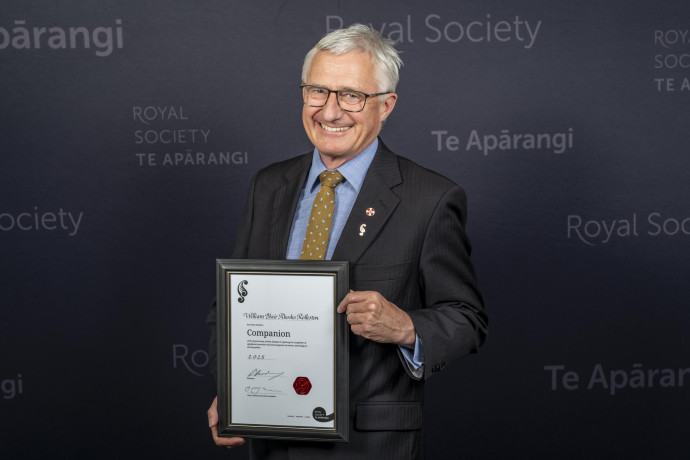News
Published 9 October 2025Speaking up for biotechnology

Dr William Rolleston CNZM CRSNZ has been elected as a Companion of the Royal Society Te Apārangi for promoting science and technology in the agricultural sector.
A committed advocate for a strong science system and for evidence-based decision-making in farming, business, and government, he has led and served on many boards and committees. These include:
- Government Innovation and Science Boards
- Science System Advisory Group
- Federated Farmers
- World Farmers Organisation
- Genomics Aotearoa
- Biotenz (now BiotechNZ)
- Life Sciences Network.
He co-founded South Pacific Sera Ltd, a biotechnology business which grew out of his family’s farming operation, and is now an exporter of animal vaccines, biologics, serum, and protein products.
"True scientists are able to revise their conclusions on new evidence; fundamentalists hold out in spite of it" – William Rolleston
William grew up in Timaru with science and conservation as a constant backdrop.
His maternal grandparents, who farmed Blue Cliffs Station where William now lives with his family, had a "great interest in nature and New Zealand history". His grandfather was a medic-turned-farmer, and his grandmother, Airini Woodhouse, created an herbarium of all the plants on the property and wrote four books on early New Zealand history. She found the last ever sighted laughing owl, an extinct native species, dead on the roadside.
William’s great-grandfather, also William Rolleston, was the last Superintendent of Canterbury, and his great-grandfather’s brother George was a Professor at the University of Oxford, a Fellow of The Royal Society, and stood with Charles Darwin in the debate on evolution.
With these family influences, William had narrowed down his career options to medicine and farming when he left school. "My decision-tree was: pass medical intermediate and go doctoring, or fail and go farming. The fact that I ended up in farming, having completed a medical degree is history repeating itself."
William came across the biotechnology industry by attending a talk while working at a hospital in the UK. The speaker described a company he had set up on a farm producing polyclonal antiserum.
William then came back to New Zealand to set up South Pacific Sera with his brother, John, taking blood from animals at their family farm to produce antiserum and other products for diagnostics and therapeutics. “This was the opportunity to bring medicine and agriculture together!” William said.
South Pacific Sera has since expanded into vaccine and pharmaceutical production.
In the mid-1990s William was elected the first chair of the biotechnology industry organisation that is now called BiotechNZ. "I remember flying home from Wellington following a board discussion on genetic modification and the misinformation which was being peddled to stop its progress in New Zealand. ‘Someone has to stand up to this nonsense,’ the board said, and I thought ‘I’m the chair of the biotech industry – that somebody has to be me’."
William says that the internet has accelerated the spread of misinformation and disinformation but it has always been a part of our society.
"The GM debate began in the early days of the internet but misinformation underlay many of the opponents’ arguments."
"I learnt from the Royal Commission that those opposed to genetic modification were, with a few exceptions, good people who wanted to do the best for the world. I share a mutual respect with many of them."
William says the lessons he learned about sticking to the science and the evidence stood him in good stead though his leadership of Federated Farmers and the World Farmers Organisation.
"Just like the debates on fluoride, 1080, and immunisation, we need to start with the evidence to form a view and make decisions, not start with a view and seek only that evidence to support it."
"As Darwin showed, and Galileo before him, it can be a long journey, but science (the weight of evidence) wins out in the end. True scientists are able to revise their conclusions on new evidence; fundamentalists hold out in spite of it."
Two-and-a-half decades since the Royal Commission, and the government is once again looking to revise the laws on gene technologies.
Gene technology is a modern tool that can unlock New Zealand’s potential, William said.
He acknowledges that public debate is not a comfortable place for many scientists.
"It’s not their skillset, but they do have a vital role in the critical analysis of the information which is in the public domain."
"If I can help facilitate scientists to stand up and speak up in favour of the evidence, then I will have made a difference."
